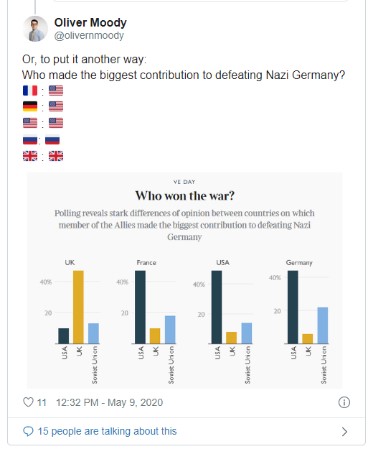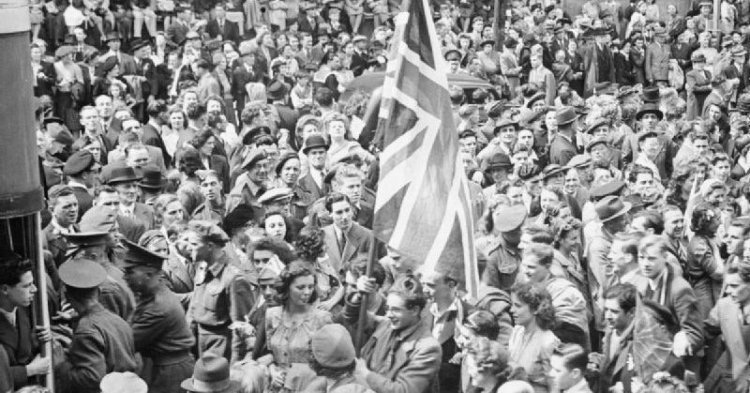The swathes of fluttering Union Jacks, the endless lines of bunting (ordered on Amazon? Or does everyone just keep stocks of it in their attics?) and the earworm-inducing melodies of “Land of Hope and Glory” from millions of living room TV sets made me as uneasy as they seemed to make my fellow citizens patriotic. Is a national flag really the best symbol we can come up with to commemorate the end of a global war in which many millions of men and women from all over the planet lost their lives?
Certainly, Britain was a key player in bringing the war to a close, and it’s important to remember the courage and sacrifice of those who contributed to the war effort in Britain. But it is no less important to pay tribute to our grandparents’ and grand-grandparents’ generation wherever they lived for the hardship, fear and grief they endured during this time. There is also a heavy irony in brandishing the flamboyant pattern of red, white and blue to celebrate the defeat of the tyranny of Hitler at a time when the British Empire was still exerting its own form of tyranny in many of the countries it invaded centuries before.
Portraying “the Brits” as the exclusive winners of a war is as senseless as the repeated misuse of the term “the Germans” to refer to the Nazis and the Axis powers. Aside from the misspelling of “contributed” and the fact that today’s emojis don’t allow for a historically accurate representation of nations in 1945, I appreciated this acknowledgement of former MEP Anthony Hook who tweeted that defeating Hitler was a collective effort by many different countries:
On #VEDay75 thanks to all the allied nations who contribited to the defeat of fascism-Nazism
🇬🇧 🇺🇸 🇫🇷 🇨🇦 🇦🇺 🇳🇿 🇳🇱 🇳🇴 🇧🇪 🇩🇰 🇧🇴 🇧🇷 🇨🇳 🇬🇷 🇲🇽 🇵🇱 🇿🇦 🇭🇷 🇷🇸 🇧🇦 🇷🇺 🇹🇼 🇮🇳 🇵🇰 🇱🇰 🇯🇲 🇧🇲 🇧🇧 🇰🇳 🇱🇺 🇲🇹 🇨🇾 🇵🇭 🇲🇳 🇳🇵 🇿🇼
Any many more nations from which many individuals fought for the allies
— Antony Hook 🔶️ former MEP (@AntonyHookMEP) May 8, 2020
Part of the danger of national narratives is that we can make them relate anything we want. The Tweet below by a journalist at The Times, a London-based newspaper, explains some of the mismatch in global perceptions surrounding the end of the war (and also explains many of the recent arguments between a British friend of mine and her French boyfriend):

This survey lays bare the futility of pretending we did and can act alone; other nations, it turns out, can do exactly the same. At the end of the day, what are we really celebrating? National military victory or the end of the war? What are we really celebrating, between the glory of international significance, or jointly achieved peace? What do we deem more worthy of our celebrations – inflating a national narrative, or making the horrors of war between European nations unrepeatable? VE Day and Europe Day occur over the same 48-hour period and are largely treated as separate events with the former given vastly more coverage than the latter. Yet, if we want to celebrate peace, they should be two sides of the same coin.
Amongst the celebrations on VE Day, the role of the European project is conveniently forgotten – especially by populists. Yet the founding members of the European Coal and Steel Community needed courage and humility to share these two key resources, these symbols of national sovereignty. The Schuman declaration on 9th May 70 years ago was the beginning of institutionalised recognition that peace as a common goal is more important than jealously guarding one’s own valuables for the sake of it. Those who showed themselves so keen to celebrate the end of war with national flags – including Marine Le Pen who paraded a French flag and wreaths of flowers on 8th May – should be ready to celebrate a lack of war as well.
It is the European project which has brought us to today’s unimaginability of war on our continent in just a couple of generations. My parents’ elderly neighbour’s brother is buried in Germany; I study there. Populists who push national wartime narratives undermine the achievements of Europe and risk tearing it apart again. We should remember that, in 1945, we defeated not a nation, but nationalism. In failing to distinguish the two, we are in danger of returning to darker times.


Follow the comments: |
|
